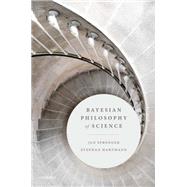
Bayesian Philosophy of Science
by Sprenger, Jan; Hartmann, Stephan-

This Item Qualifies for Free Shipping!*
*Excludes marketplace orders.
Rent Textbook
Rent Digital
New Textbook
We're Sorry
Sold Out
Used Textbook
We're Sorry
Sold Out
Summary
Author Biography
Jan Sprenger, University of Turin,Stephan Hartmann, LMU Munich
Jan Sprenger is Professor of Philosophy of Science at the University of Turin. After completing an undergraduate degree in mathematics, he obtained his PhD in Philosophy at the University of Bonn in 2008. He then took up a post at Tilburg University, first working as Assistant Professor (2008-13) and subsequently as Full Professor (2014-17). He also directed the Tilburg Center for Logic, Ethics and Philosophy of Science (TiLPS). Sprenger's research and publications span a wide range of topics, mainly in philosophy of science and uncertain reasoning, but also in logic, group decision-making, and empirical work on human cognition.
Stephan Hartmann is Professor of Philosophy at LMU Munich, Alexander von Humboldt Professor, and Co-Director of the Munich Center for Mathematical Philosophy (MCMP). Between 2007 and 2012 he worked at Tilburg University, where he was Chair in Epistemology and Philosophy of Science and Director of the Tilburg Center for Logic and Philosophy of Science (TiLPS). Prior to this, he was Professor of Philosophy at the London School of Economics and Director of its Centre for Philosophy of Natural and Social Science. He was President of the European Philosophy of Science Association (2013-17) and President of the European Society for Analytic Philosophy (2014-17). Hartmann's primary research and teaching areas are philosophy of science, philosophy of physics, formal epistemology, and social epistemology. His current interests also include the philosophy and psychology of reasoning and argumentation.
An electronic version of this book is available through VitalSource.
This book is viewable on PC, Mac, iPhone, iPad, iPod Touch, and most smartphones.
By purchasing, you will be able to view this book online, as well as download it, for the chosen number of days.
Digital License
You are licensing a digital product for a set duration. Durations are set forth in the product description, with "Lifetime" typically meaning five (5) years of online access and permanent download to a supported device. All licenses are non-transferable.
More details can be found here.
A downloadable version of this book is available through the eCampus Reader or compatible Adobe readers.
Applications are available on iOS, Android, PC, Mac, and Windows Mobile platforms.
Please view the compatibility matrix prior to purchase.
